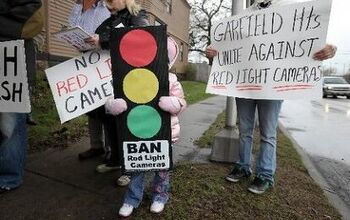Freedom for Sale In the Red Light District
If patriotism is the last refuge of a scoundrel, then death is the only refuge of a camera-craving road safety campaigner. As far as these well-meaning advocates are concerned, if a single roadside surveillance device saves a single life, then it’s fully justified. Never mind scientific distinctions between “speeding” and “inappropriate speed.” Never mind government studies that place red light running near the very bottom of the list of accident causation. Never mind concerns about the erosion of personal privacy. One life trumps all.
In fact, when it comes to red light cameras, it’s 850 lives. The National Highway Traffic Safety Administration (NHTSA) estimates 850 people were killed by motorists running red lights. The number looks– is– horrific, but it’s slightly less than two percent of all 2006 U.S. traffic fatalities. Throwing resources at this area of road safety seems, at best, counterintuitive.
Of course, red light cameras are one area where the money spent is dwarfed by the money the system generates for its operators– both civil AND commercial. It’s a paradigm that helped convince some 250 U.S. communities to install red light cameras, with California and Texas leading the way.
Campaigners are delighted. Richard Retting, senior transportation safety engineer for the Institute of Highway Safety (IIHS) claims “the jury is in”: red light cameras save lives. But the IIHS’ recent and highly touted red light study followed a two-step approach. First, researchers extended the yellow light cycle. THEN they added red light cameras.
The study claims that violations dropped by 36% after the yellow light change, followed by a 96% reduction in the remaining violations. Yes, but– the IIHS failed to provide any data whatsoever on actual accidents.
And no wonder. In the last six years, Washington, D.C.’s red light cameras caught over 500k violators, generating some $32m in fines. The Washington Post unearthed the resulting safety stats.
“The number of crashes at locations with cameras more than doubled, from 365 collisions in 1998 to 755 last year. Injury and fatal crashes climbed 81 percent, from 144 such wrecks to 262. Broadside crashes, also known as right-angle or T-bone collisions, rose 30 percent, from 81 to 106 during that time frame.”
If road safety campaigners are going to manipulate data and then say it doesn’t matter because a single life may be saved, opponents should be free to discuss the camera’s impact on personal freedom without recourse to scientific fact. Because with each camera install, no matter how “good” the case for a particular system may be, we lose a bit of our freedom.
Make no mistake: red light cameras and fixed speed cameras raise important constitutional questions. Does the presumption of innocence that forms the backbone of our judicial system extend to electronic surveillance? How can it be argued that a camera monitoring the speed and/or position of every car that passes does NOT violate that tenet?
A Georgia car owner who swears they weren’t driving when their car was caught by a red light camera can sign an affidavit to that effect, and avoid the fine. But they must also name the person who ran the light. What happened to their right to remain silent?
The Constitution of the United States specifically prohibits the government from conducting “indiscriminate search and seizure.” What could be more indiscriminate than a red light camera watching every single car that passes?
How about a live video camera that monitors the speed of every single car that passes? Or one that can instantly read and identify every license plate, connected to a network of such devices?
Ask the people of Great Britain. The government is adding hundreds of automatic number plate recognition (ANPR) cameras to their roadway system– complementing the tens of thousands of surveillance cameras installed in virtually every municipality in the entire country. Great Britain is now the most surveilled country on the face of planet earth– and their road safety is decreasing.
Now that the English are finally rebelling against the “safety camera” system, the government is sure to change tack and switch to video speed cameras. They can then claim the cameras are an important aid to anti-terrorism. But it can also be argued that red light, fixed speed, surveillance and ANPR cameras are a slippery slope to government tyranny.
Years ago, I was setting up computers for a training session for local police detectives. We talked about the burgeoning on-line world, replete with stalkers and all the rest of what’s truly bad about the ‘Net. As I was about to leave, I naively remarked to one detective: “Well, I don’t do anything wrong, so I’ve nothing to hide.” His reply woke me from my innocent mental slumber: “Don’t be so quick to give up your freedoms.”
Glenn is a baby-boomer, born in 1954. Along with his wife, he makes his home in Connecticut. Employed in the public sector as an Information Tedchnology Specialist, Glenn has long been a car fan. Past rides have included heavy iron such as a 1967 GTO, to a V8 T-Bird. In between those high-horsepower cars, he's owned a pair of BMW 320i's. Now, with a daily commute of 40 miles, his concession to MPG dictates the ownership of a 2006 Honda Civic coupe which, while fun to drive, is a modest car for a pistonhead. As an avid reader, Glenn enjoys TTAC, along with many other auto-realated sites, and the occasional good book. As an avid electronic junkie, Glenn holds an Advanced Class amateur ("ham") radio license, and is into many things electronic. From a satellite radio and portable GPS unit in the cars, to a modest home theater system and radio-intercom in his home, if it's run by the movement of electrons, he's interested. :-)
More by Glenn Swanson
Latest Car Reviews
Read moreLatest Product Reviews
Read moreRecent Comments
- RHD They are going to crash and burn like Country Garden and Evergrande (the Chinese property behemoths) if they don't fix their problems post-haste.
- Golden2husky The biggest hurdle for us would be the lack of a good charging network for road tripping as we are at the point in our lives that we will be traveling quite a bit. I'd rather pay more for longer range so the cheaper models would probably not make the cut. Improve the charging infrastructure and I'm certainly going to give one a try. This is more important that a lowish entry price IMHO.
- Add Lightness I have nothing against paying more to get quality (think Toyota vs Chryco) but hate all the silly, non-mandated 'stuff' that automakers load onto cars based on what non-gearhead focus groups tell them they need to have in a car. I blame focus groups for automatic everything and double drivetrains (AWD) that really never gets used 98% of the time. The other 2% of the time, one goes looking for a place to need it to rationanalize the purchase.
- Ger65691276 I would never buy an electric car never in my lifetime I will gas is my way of going electric is not green email
- GregLocock Not as my primary vehicle no, although like all the rich people who are currently subsidised by poor people, I'd buy one as a runabout for town.


































Comments
Join the conversation
Well, I'll sound off here and I hope to not be offensive. Have any of you ever been to other countries and been completely scared out of your wits by their driving? I will go on record and say that if you have ever been to a developing country from Latin/Central/South America, Asia, Africa and parts of Europe you'll know what I'm talking about. I've travelled to and worked in every continent on the planet (minus Antarctica) and have witnessed the driving habits of dozens of different countries. I've driven in countries where traffic continued to flow through an intersection LONG after the red light flashed. I'm not talking about stragglers - I'm talking about the whole line of traffic. Or they begin to drive through the intersection before the light has turned green. I've seen the direction of a one way street change 180 degrees. I'm amazed by the poor driving in many countries. Not in all. I'm not saying that the US has a monopoly on safe driving habits. I've felt completely safe in Canada, Germany, Switzerland, Austria, Australia and many other places. As long as the US is the destination of choice for many immigrants (both legal and otherwise) from so many developing countries, then we will continue to see driving safety issues escalate. You only need to observe the driving habits of that culture to determine the influence they will have on our society unless they are educated on the habits/expectations of the law of our land. Extending yellow lights and the time between red and green lights of perpendicular traffic will not solve the problem. People will just have even more time to run the light. Also, if a person has six seconds of yellow light, think of how much speed they can accumulate by flooring it during that time. I'm not trying to single out any particular nationality or even suggest that they ARE the problem. I've certainly observed plenty of good ole boys, business men and inattentive soccer moms blatantly running red lights. But I can't help noticing the correlation of 1) the rising poor driving habits in the US with 2) the poor driving habits of many developing nations and 3) the rising number of immigrants from said developing nations into the US. My observations are not meant to spark any hate mongering against any foreign person/nationality. I personally think that immigration into the US is vital to it's success. And I welcome them. The US is and has ALWAYS been a nation of immigrants (both legal and illegal). One of the challenges for our nation since it's inception has been learning to deal with the cultural differences that occur when so much diversity is thrown into the mix together at one time. Cities such as NYC, San Francisco, Chicago, Miami and many others have been living with these cultural challenges for decades/centuries. I personally think this (driving habits) is one of those cultural clashes that our generation must learn to deal with. How many of the red light offenders are first generation immigrants? I have no idea. I seriously doubt they are the majority. But I do believe they've contributed to the problem, especially in diverse communities. Anyone care to discuss?
I've not read all of the comments, but I wonder something. This may stop some people from running red lights, but is it really the people who are generally causing fatalities? What I mean is (and I'm just imagining) here, is that most of the tickets issued for red light infractions are the people who roll through 2 seconds after the light has changed...not the ones who come barreling through because their stupid, or drunk, or both at 55 after the light is very red. IF you're going to run a light like that, I don't think that a camera or a cop or anything is going to stop you from killing the innocent driver who's going the other way. I live in France where the new best thing is the speed camera...well new for the last 5 or 6 years. It is an object of fascist state control. There is no way [basically] to not get a ticket. If your car gets "flashed" you're basically screwed, or you've gotta rat on someone else. But this takes into no account the speed of traffic, the conditions, the time of day, anything - even the calibration of the camera...how do we know that it really works? For city and surface street driving they "give" you a 5 kph break (55 become 50), highways are 6 or 7kph. That means that your speedo really better mean 135 when you're on the highway. The best part, and the proof for me that this is a money making opportunity: When you get a ticket (yeah, I know from experience) you can pay within 45 days at one rate (~ -25% reduction), from 45-90 days at the 'standard' rate, or the default rate (like 5x more than the standard rate) after 90 days. You can plea non coupable, but you have to prepay the standard rate. If the government finds that you are guilty (most of the time) you have to pay the standard rate...Basically you can shut up and take your punishment or get screwed even harder. Apparentyly they are also really looking forward to those ANPR cameras...they had a story on the news a few weeks back about how well they work in Britain. liberté, fraternité, égalité my ass.